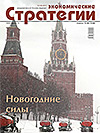New Year’s Forces
Opening address of editor-in-chief.

Opening address of editor-in-chief.
The article considers the actual economic interests of Russia and the Eurasian Economic Union in the process of formation of the Great Eurasian partnership in the face of current challenges. An approach is proposed to implement these interests on the basis of an analysis of benefits and risks.
The article is dedicated to forming the Russian cluster of transport-transit and fuel-energy corridors of Eurasia as a Russian counterpart partner project integrated with the Chinese Economic belt of the Silk Road. The authors substantiate the necessity of creating the Eurasian distributed mega-hub, oriented to consolidated management for the use of the transport-transit and fuel-energy infrastructure of Russia and other states-participants of the EAEU, combined with a similar Chinese infrastructure. The technological base of such a project is the infrastructure for production and transportation of fuel, energy, raw materials, food and other resources and for provision of logistics and other services in the structure of infrastructure-transport directions (corridors) “China–Russia–Europe” and “Russia–China–Asia”. It is proposed to change Russia’s business positioning in cooperation with China for its integration as a key operator in the structure of providing transport and transit services and supplying fuel and energy resources in Europe and Asia. On this basis, it is possible to form mechanisms both for coordinating trade of products and resources, as well as agreeing in mutually beneficial interests between Russia and China on various technological, economic, information and other aspects that ensure synchronization of the processes of rendering transport and transit services and energy supply to consumers in different territorial zones of national economies of Europe and Asia.
The article is investigating structural changes in the economy before these shifts are reflected in well-known statistical indicators. It dwells on the changes in the economy that occurred in 2011–2015 based on the data from relatively big companies in Russia from SPARK group. The method proposed by the authors shows the presence of structural shifts in the period under study. The article also discusses possible consequences of structural shifts for development of regional economy and the budget system of Russia.
Changing of a conjuncture index of “Economic strategy” (CIES) for January — September 2017 is considered. The contribution of indicators of supply and demand in CIES is estimated. The analysis of industrial production is carried out.
In the basis of modern globalized science there is the science itself, and it is postulated that it is objective, law-abiding (discursive), is the only correct, last, final method of cognition, hasn’t got a civilizational, cultural, linguistic or national component. But if the world is too complicated for single-focus control, then the Universe must be too complicated for single-focal cognition. Then globalized science, considered as the only possible format of cognition, creates a number of unacceptable risks at the level of humanity, as it fixes very narrow range of possible development scenarios. Therefore, it is necessary to create a description of the science dependencies, to answer the question of how language, cultural codes, civilizational preferences, national character and national interests are reflected in methodology of science, directions and paces of its development, how these social determinants fit into the scientific cognition results and where they are contained in these results.
At the beginning of the zero years of the XXI century there was a strong opposition of anti-globalists and globalists (mainstream) on the global agenda of development formed at the turn of the 1980-1990s in the XX century. In the middle of the second decade of the XXI century due to the green strategy of the global economy in relation to the new goals of sustainable development until 2030, these positions have shifted so much that the terms used do not reflect their original significance any more, which impedes the comprehension of actual processes, creating the illusion of radical changes in globalization processes in order to overcome negative trends on the way towards sustainable development. The article, on the basis of discussions on comprehending results of modern globalization a decade after its beginning, analyzes these changes and proposes terms more reflecting the essence of the ongoing global processes.
Competent management of competitiveness in the innovation environment provides economic entities with enormous opportunities for economic growth and development. In this article, the author has studied characteristic features of European countries’ innovative development in order to use foreign experience for working out recommendations in managing competitiveness of the national economy of the Republic of Belarus, in particular — machine building complex. As the objects of research the author has chosen such countries as Italy, France, the USA and Germany.
Widely used in Russia, the typical methodology of “high-speed foresight” has a number of shortcomings and limitations. Based on recent discoveries of social anthropology and cognitive neuroscience, a transition to “shamanistic foresight” is possible. The new methodology can be effectively used to form a long-term vision for the future of the Siberian and Far Eastern regions of the Russian Federation.
The RF State Duma adopted in the third reading amendments to the Law “On Communications”. The documents acquired new important additions aimed at combating telephone terrorism and allowing to block telephone terrorists’ numbers. The authors of amendments became the Chairman of the State Duma V.V. Volodin, as well as the heads of the relevant committees on security and communications. First deputy head of “The United Russia” faction, Andrei K. Isaev, and the deputy head of the LDPR Political Party faction, chairman of the State Duma Committee on Labor, Social Policy and Veterans Affairs, Yaroslav E. Nilov, told in details about the amendments in their conversation with the special correspondent of the “ES” magazine Valentina Nikolskaya.